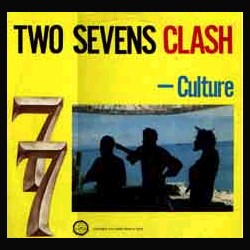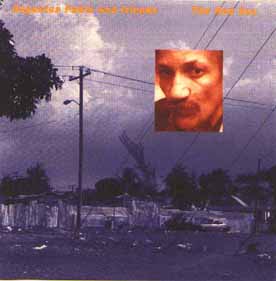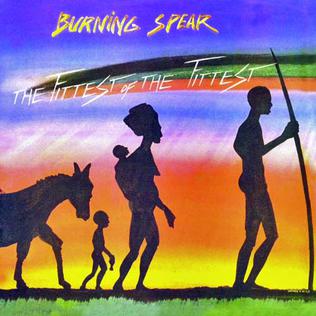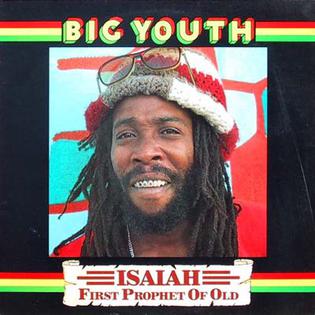Joe Gibbs born Joel Arthur Gibson was a Jamaican reggae producer.

Marcus Garvey is the third album by reggae artist Burning Spear, released in 1975 on Fox Records in Jamaica and then internationally on Island Records later in the year. The album is named after the Jamaican National Hero and Rastafari movement prophet Marcus Garvey. A dub version of it was released four months later as Garvey's Ghost.

Garvey's Ghost is the fourth album by the reggae artist Burning Spear, released in 1976 on Island Records, ILPS 9382. Each track is a dub version of its correspondent song on his third album, Marcus Garvey.

Two Sevens Clash is the debut album by roots reggae band Culture, recorded with producer Joe Gibbs at his own Joe Gibbs Recording Studio in Kingston in 1976, and released on Gibbs' eponymous label in 1977. The album's title is a reference to the date of 7 July 1977.
Socialist Roots Hi-Fi was a prominent Jamaican reggae sound system and record label owned by Tony Welch in the 1970s and early 1980s. It was originally named King Attorney. The name changed in 1976 when Welch bought the set. Regular deejays included Ranking Trevor, U Brown, Jah Mikey and Nicodemus, alongside the regular selector Danny Dreadlocks. They received dub cuts from Bob Marley & The Wailers. After 1981, the group was known as Papa Roots Hi-Fi.

Man from Wareika was the first album recording for Rico Rodriguez led by his own artistic imagination, and his first recording created for album release. It is notable for being the only roots reggae album to be released on Blue Note Records.

Marcus' Children is a studio album by the Jamaican musician Burning Spear, originally released in 1978 as Social Living. It was produced by Karl Pitterson and Burning Spear.

Red Sea is a studio album by Augustus Pablo released in 1998, containing material recorded between 1970 and 1973 and was produced by Herman Chin Loy. The music on the album is among the earliest instances of Pablo's revolutionary use of the melodica as a viable musical instrument. Chin Loy is often credited as being an influential figure in the discovery and nurturing of Pablo's talent.

The Fittest of the Fittest is an album by the reggae musician Burning Spear, released in 1983.

Living Dub is a dub album by the Jamaican artist Burning Spear, his third overall and second under the name "Living Dub".

Baldhead Bridge is the second album by the Jamaican roots reggae band Culture, released on Joe Gibbs Records in 1978.
The Revolutionaries was a Jamaican reggae band.

Isaiah First Prophet of Old is an album by the Jamaican musician Big Youth, released in 1978. It was produced by Devon Russell.

Natty Universal Dread 1973–1979 is a 3-CD-Box-set by Big Youth, released in 2001.

Pick Up the Pieces is the debut album from Jamaican roots reggae group The Royals, collecting recordings made between 1973 and 1977, and produced by Royals lead vocalist and only constant member Roy Cousins. Musicians on the album include members of The Wailers, Soul Syndicate, The In Crowd, and the Now Generation Band. The album was later licensed to United Artists subsidiary Ballistic Records, and was reissued in an expanded form in 2002 by Pressure Sounds. The songs on the album have been described as "some of the most musically sublime expressions of Rastafarian faith and the hardships of ghetto living Jamaica has produced".
Soul Syndicate, originally called the Rhythm Raiders, were one of the top reggae session bands in Jamaica from the early 1970s to the mid-1980s.

Cool Ruler is a 1978 studio album by Gregory Isaacs, his first released on the Virgin Records subsidiary Front Line. The Jamaican release was on Isaacs' African Museum imprint. The album was produced by Isaacs and mixed by Lancelot "Maxie" McKenzie at Channel One Studios in Kingston, Jamaica. Of the tracks on the album, "Let's Dance" had previously been released as a single. Some of the tracks on the album are considered among the best ever recorded by Isaacs, although the album failed to give him the international breakthrough that had been anticipated. The album title did, however, endure as Isaacs' nickname. "John Public" was also released as a single. The album formed the basis of the dub album Slum in Dub, released the same year. Cool Ruler was reissued on compact disc by Virgin in 2000.

Wolf and Leopards is a 1977 reggae album by Dennis Brown.

Pure Gold is a 1975 compilation album of 10 studio recordings by Glenn Miller and his Orchestra recorded between 1939 and 1942 by RCA Victor. The recordings were all originally issued as 78 RPM records on the RCA Bluebird and Victor labels and was certified Gold by the RIAA. The album was originally issued on LP and compact disc in reprocessed (fake) stereo sound; in 1988, RCA remastered the album in original monophonic sound for its second CD reissue. The album was also reissued on LP that year under a new catalog number (7648-1-R) and inexplicably omits two tracks, both of which appear on the reissued CD.















